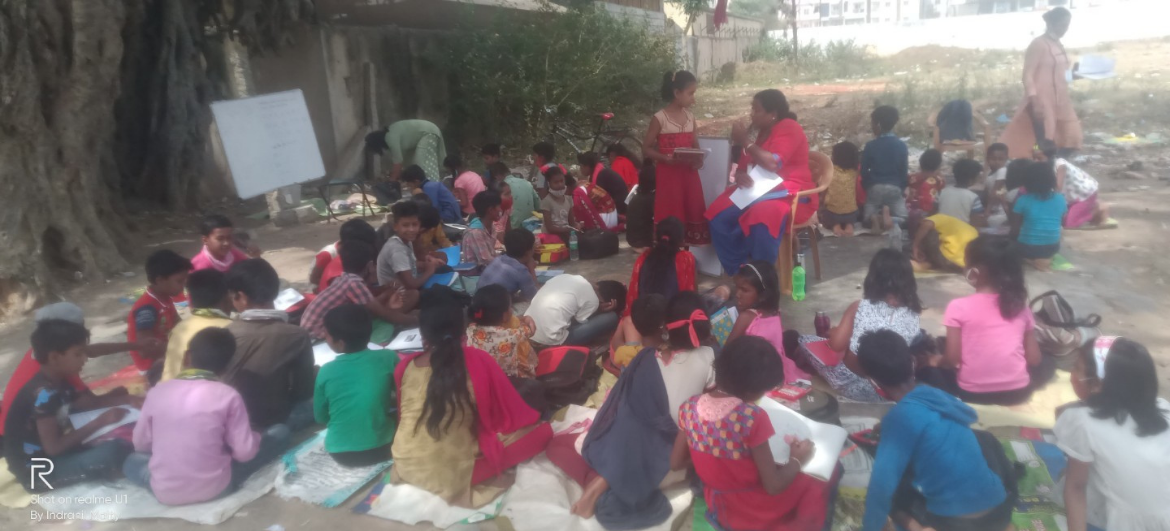Quis autem velum iure reprehe nderit. Lorem ipsum dolor sit nulla or narjusto laoreet onse ctetur adipisci.

Samridhdhi
Supported by: Wipro Cares
About Samridhdhi Trust
Samridhdhi Trust is a Bangalore-based NGO striving for more than 10 years to tackle the problem of out-of-school children; more specifically pertaining to children of migrant workers. The economic attractiveness of big cities such as Bangalore, Hyderabad, Mumbai or Delhi NCR has led thousands of families to migrate to these cities at the expense of their children’s education. Those children aren’t just missing years of education; some of them have never set foot in school before. This situation needs to change if the country wants to stop suffering from the problem of illiteracy and unemployment, as some of them even get involved in undesirable activities.
Samridhdhi Trust has been working in this direction for more than ten years to address this phenomenon in Bangalore and Delhi NCR using a unique continuum of programs to strive against this growing concern and improve the lot of underprivileged children. The focused approach and efforts put in by Samridhdhi Trust is helping these underprivileged children gain access to formal education and join mainstream of Indian society.
The idea being that this situation would spiral out of control due to lack of actions and create numerous related issues where the children will be the victims of poverty, delinquency, social exclusion etc. Trying to solve it once the situation has taken roots will be nearly impossible – education is the key to lifting these children and their communities out of their current situation and finding a long-term solution.
The Approach – From cradle to employability
The unique and holistic approach of “From cradle to employability” ensures maximum efficiency in achieving the desired goal. The working model in Samridhdhi Trust is based on a 360-degree approach towards the holistic development of the migrant children and the communities they come from.
Step 1: Out-of-school children aged 6-14 years are identified through surveys and enrolled in the ‘Bridge Programs’
Step 2: After a year in the Bridge Schools, the children are integrated into a government or English-medium private school.
Step3: Through their schooling years, children are supported for 2 hours a day through the ‘Afterschool Programs’
Step 4: The children who move on to vocational training or higher education in colleges are supported with the ‘Finishing Schools’.
Step 5: Samridhdhi facilitates the higher education and placement of young graduates.
Throughout the process, need-based steps are taken to ensure the children continue with their education. Our approach is the key component of our action – we do not just address the problem; we have designed a specific way to do it with the maximum efficiency. Our motto is “from cradle to employability” – the Bridge program is the stepping-stone of this program continuum. For one more year, Indirapuram Bridge School Project has been able to deliver to these children in need:
- Access to academic education, allowing every child to be able to join the mainstream education cycle according to their age group.
- Access to nutrition, health, and hygiene education to improve their everyday life and health during pandemic.
- Access to life skills and a specific attention to their problems in order to help them flourish as well-developed individuals.
- Access to food, uniforms, nutrition, immunities, and healthy habits.
- Access to events and green plantations for the children to enjoy their childhood at the fullest like any other child would!
The Bangalore (Nallurahalli) Project is one of our earliest projects and we had enrolled 111 Children (52 Girls and 59 Boys) out of 235 children surveyed for the project for the academic session July 2020 to June 2021. Due to the lockdown, we did face a few challenges in conducting online classes owing to poor network coverage, non-availability of gadgets to the children. However, we are happy to report that we could sustain and improve our activities and retain the children in the program.
New approaches adopted in response to COVID
The current year was greatly impacted by the COVID Pandemic totally disrupting life globally. The impact of lockdown on migrant workforce and their children was particularly severe; totally disrupting their livelihood and creating huge uncertainty about food and shelter. During the period April-June 2020, many of the migrant workers went back to their native places, thus impeding the project substantially, as the children were not able to attend the program. However, once the lockdown was lifted and economic activity started picking up, they started to return in order to begin all over again. This severely disrupted our own activities too as the children could neither attend schools nor join online classes due to unavailability of smartphones.
To provide access to formal education through our multi-layered model was a big challenge due to the lockdown and the pandemic. We could not conduct physical classes during the year as the schools were closed. We had to arrange for online classes, which, again, was a great challenge due to the unavailability of internet connections/adequate smartphones/laptop with the children.
However, we are happy to report that we were able to resolve this issue. We modified our approach and conducted classes online in order to ensure continuity. We also ensured that these children don’t slip back into the vicious circle of no education leading to non-employability, which in turn would result in poverty and undesirable activities.
We are also happy to report that we could extend further help to the community by distributing grocery kits and food to these families. Our committed team also convinced many of the workers not to go back to their native place.

